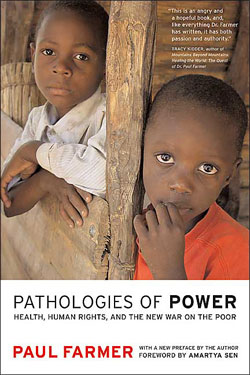Book Notes
 Paul Farmer, Pathologies of Power; Health, Human Rights, and the New War on the Poor (Berkeley: University of California Press, 2003), 402pp.
Paul Farmer, Pathologies of Power; Health, Human Rights, and the New War on the Poor (Berkeley: University of California Press, 2003), 402pp.
Paul Farmer is a Harvard MD and PhD (anthropology), clinician, tuberculosis specialist, author of numerous books and scholarly articles, recipient of a MacArthur "genius" grant, and Professor of Medical Anthropology at Harvard Medical School—when he is not living in a hut in his beloved Haiti where he founded Partners in Health, or traveling a quarter million miles a year to lecture, visit prisons, or meet with George Soros or the Gates Foundation. Most important of all, Farmer is an unapologetic, outspoken, and radical advocate for the poorest of the poor. Adequate health care, he insists, is a basic human right for every human being, and our world is failing miserably in this regard. His fascinating life story is told by Pulitzer Prize winner Tracy Kidder in the book Mountains Beyond Mountains (2003).
According to a World Bank study from 1993, today in Sub-Saharan Africa "the median age at death is less than five years," (p. xi; no typographical error). Such deplorable disparities between rich and poor, Farmer writes, are not random occurrences, they are not accidental, inescapable or necessary. Rather, they result from pathologies of power, human agency, and structural violence. Quoting the liberation theologian Jon Sobrino, "The poor of the world are not the causal products of human history. No, poverty results from the actions of other human beings" (p. 143). Which is to say that the brutal asymmetry that consigns over half the world to wretchedness is not irremediable. Resignation, in fact, is the most inexcusable choice we could make. However daunting and complex, we can ameliorate these unacceptable conditions if we make other choices: "This book is a physician-anthropologist's effort to reveal the ways in which the most basic right—the right to survive—is trampled in an age of great affluence, and it argues that the matter should be considered the most pressing one of our times" (p. 6).
Farmer spends considerable time charting anecdotal evidence from his two decades of clinical practice serving the poorest of the poor. These detailed case studies from Haiti, Chiapas, Peru, Russia and Cuba are not mere examples but instead emblematic of the problem. Further, following liberation theologians who have deeply influenced him, Farmer strongly advocates listening carefully to the voices of the poor themselves, in their own words, and not only to health "experts" in Geneva, New York and Paris. "I believe," writes Farmer, that 'the poor and impoverished of the world, in virtue of their very reality, constitute the most radical question of the truth of this world, as well as the most correct response to this question'" (p. 202).
Some will dismiss rhetoric like that as from a wild-eyed idealist, or an angry extremist, but Farmer would respond that what is extreme and harsh are the conditions of way too many human beings in the world, which ought to evoke anger, and not his passionate advocacy for them (p. 254). Rather than merely "manage" these horrible social inequalities, Farmer challenges each one of us to make a difference by what he calls "pragmatic solidarity" with the poor.


